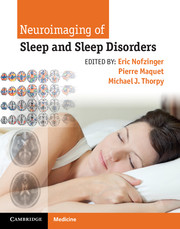Book contents
- Neuroimaging of Sleep and Sleep Disorders
- Neuroimaging of Sleep and Sleep Disorders
- Copyright page
- Contents
- Contributors
- Foreword
- Preface
- Section 1 Introduction
- Section 2 Neuroimaging of wakefulness and sleep
- Chapter 11 Neuroimaging of wakefulness
- Chapter 12 Neuroimaging of phasic and non-phasic NREM activities
- Chapter 13 Functional connectivity in wakefulness and sleep
- Chapter 14 Functional neuroimaging of human REM sleep
- Chapter 15 Complementarity of dream research and neuroimaging of sleep
- Section 3 Neuroimaging, sleep loss, and circadian misalignment
- Section 4 Sleep and memory
- Section 5 Neuroimaging of sleep disorders
- Index
Chapter 13 - Functional connectivity in wakefulness and sleep
from Section 2 - Neuroimaging of wakefulness and sleep
Published online by Cambridge University Press: 05 March 2013
- Neuroimaging of Sleep and Sleep Disorders
- Neuroimaging of Sleep and Sleep Disorders
- Copyright page
- Contents
- Contributors
- Foreword
- Preface
- Section 1 Introduction
- Section 2 Neuroimaging of wakefulness and sleep
- Chapter 11 Neuroimaging of wakefulness
- Chapter 12 Neuroimaging of phasic and non-phasic NREM activities
- Chapter 13 Functional connectivity in wakefulness and sleep
- Chapter 14 Functional neuroimaging of human REM sleep
- Chapter 15 Complementarity of dream research and neuroimaging of sleep
- Section 3 Neuroimaging, sleep loss, and circadian misalignment
- Section 4 Sleep and memory
- Section 5 Neuroimaging of sleep disorders
- Index
Summary
Keywords
- Type
- Chapter
- Information
- Neuroimaging of Sleep and Sleep Disorders , pp. 105 - 113Publisher: Cambridge University PressPrint publication year: 2013

